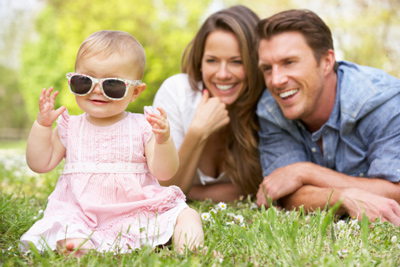A child with a sense of humor is more able to make lasting friendships, loved by his peers and extend the good vibes to their adult relationships to more successfully manage frustrations , prevent conflicts and, ultimately, suffer less and enjoy more. In addition, the humor is related to intelligence, self-esteem , the creativity and problem solving.

At first splat !, bum !, cuckoo!
In early the laughter of babies is stimulated with physical games (tickling, etc.,) but soon, six or seven months when babies begin to understand a little the world around them, love to see what Known turned around, that is, begin to enjoy the essence of humor.
“When Ariel grabbed her bottle of water and drink simulated ear, almost fell of laughter,” says Paloma mum smaller than 18 months. “Seeing my reaction he also laughed and seemed very pleased with his new skill.”
When young “caught the joke” is a clear sign that they are developing important intellectual skills. Therefore it is good idea to hold their laughter. Antonio, father of two small, share a foolproof trick: “Clap wrongly or go beyond, take a doll and make clapping to the beat of a song and then are wrong. Once you know the trick, anticipation of clumsiness love. ”
Handsome as father, mother … funny how
The dads and moms who laugh easily and frequently with their children understand that humor is a tool unmatched when interacting with their children, and also very useful for discipline avoiding conflict .
Furthermore, the complicity that create laughter and good times is a kind of intimate language : “I usually call my daughter Martina like Robin Hood forest, pretending that my hand is a horn and making” you, you, tuuuu “. Now Martina, who already has one year and eight months when he wants me near her or want to ask me something, makes the same motion and sound, something that only we understand and makes us very much, “Celia said.
A sense of humor can be learned or inherited, like eye color?
Some children seem to be born with a sparkling and positive character and others however seem serious and grave from tots, however experts in child psychology claim that humor can be taught and learned. In this he is like a muscle to be worked regularly. And there is little point to a course of monologues for babies … the trick: to be the best model. This does not mean add to the already difficult task of parenting an obligation to be funny -8 am, prepare toast -faced clown, 10am, tell a joke monkeys, 3 pm “stumble” with a lamppost … -. It is much easier and liberating: allow fooling (yes, that asks us the body sometimes and we restrict our adult world).
Slowly (but with laughter)
The good thing about parenting is that we have years to develop our own sense of humor as our audience grows: we start with a simple material physical humor when they are babies , before going to sing “Let it rain, let it rain” with a ridiculous voice duck, continue with a scene in which we put a shoe on his head and a hat on foot.
The family home does not have to become a comedy but remember that parenting does not have to be severe, with much advice on when to start potty training , rules on the use of pacifiers … – and there is much room for play and fun .
“My daughter Violet is a great imitator,” says Estíbaliz, “we realized recently when he told his wrist ‘cuuchi-cuuchi, my chocolate on your tongue rag and looked at us expectantly. My husband and I could not believe that with such precision imitate her grandmother, gave us a laugh !, and her, of course. And her father is a great imitator imitates her sucking his pacifier and putting eyes (Violet part to see it), my typing quickly and intently on the computer … “.

